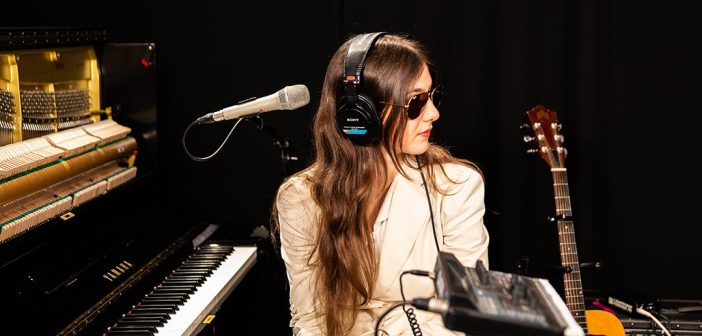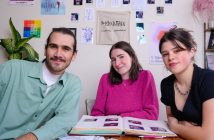“There’s a certain magic to seeing artists perform live in the studio,” Rita Houston noted in 2012, when she was WFUV’s program director and the station’s then-nascent video channel became an especially rich source for music discovery.
In a typical year, WFUV hosts and documents about 200 sessions in Studio A and 20 to 30 concerts at venues in and around New York City, with students working as audio engineers and videographers. The videos are beautifully shot and edited, and the artists thrive on the authenticity and immediacy of it all.
Here are some of the Fordham Magazine team’s favorites.
Joan Armatrading: “Down to Zero”
When legendary British singer-songwriter Joan Armatrading visited Studio A in May 2018, she was 67 years old and in her fifth decade of making music. Yet her performance of her 1976 song “Down to Zero”—a classic tale of a wayward lover begging to come back—is filled with enough raw emotion to make one think she had had her heart broken that very day. Armed only with an acoustic guitar and her contralto voice (oh, that voice), Armatrading displayed the deft musicianship and openhearted intensity that has made her a cited influence on artists including Fiona Apple, Melissa Etheridge, and Morrissey. From the opening guitar chords to the pained final recitation of the phrase “fall at my door,” it’s a gripping, stunning performance of a timeless song by one of modern folk music’s leading luminaries.
—Adam Kaufman
Lake Street Dive: “You Go Down Smooth”
The band Lake Street Dive’s WFUV roots run deep. In December 2012, at the station’s annual Holiday Cheer concert at the Beacon Theatre in Manhattan, then music director Rita Houston introduced them as one of her “favorite up-and-coming bands.” It was the biggest stage the group had played, leader singer Rachael Price noted at the time. Like many other popular WFUV artists, Lake Street Dive combines a variety of genres, including swing era jazz and classic pop, which you can hear in their November 2012 Studio A version of “You Go Down Smooth.” But the lyrical inspiration for this song, according to original band member Mike “McDuck” Olson, came from the Beatles’ “Got to Get You Into My Life.” Olson said that he was inspired by Paul McCartney’s description of that song as an ode to marijuana, and he wanted to write a love song that also could be a “veiled ode to some vice.” You can hear this contradiction play out as Price sings, “And I am afraid to need you so / And I am too sober not to know / That you may be my problem, not my love.” One thing that wasn’t a problem for the group? Capturing attention with this performance, which has garnered more than 4.2 million views, making it one of WFUV’s most popular videos.
—Kelly Prinz
Elle King: “Ex’s & Oh’s”
When Elle King belted out “Ex’s & Oh’s” live in WFUV’s Studio A in early 2015, not even her drummer could resist the urge to lip sync along. Recorded in February, the intimate performance was bluesy yet full of angsty pop charm and a bit of soul. Just a few days after the session in Studio A, King’s debut album, Love Stuff, was released, with lead single “Ex’s & Oh’s” helping to launch the album as high as No. 28 on the Billboard 200. Since then, King has pivoted into country music, singing alongside the likes of Miranda Lambert and Dierks Bentley.
—Sierra McCleary-Harris
Pixies: “Wave of Mutilation”
With a penchant for cryptic lyrics, pop hooks, and extreme dynamic shifts, the rock band Pixies released a string of influential albums in the late 1980s and early 1990s. They broke up in 1993 and reunited about a decade later. When the band visited WFUV in September 2019, they closed with the “UK Surf” version of the classic “Wave of Mutilation.” Unlike the loud and fast rendition on 1989’s Doolittle, the surf version maintains a slow, dreamy vibe that underscores the song’s surreal mystery and melodic beauty. Lead singer and songwriter Black Francis (Charles Michael Kittridge Thompson IV, aka Frank Black) recounts the narrator’s underwater adventures after driving his car into the ocean: “I’ve kissed mermaids / and I rode the El Niño. / I walked the sand with the crustaceans,” he sings. When he adds, “Could find my way to Mariana / on a wave of mutilation,” there’s a yearning in his voice that, together with Paz Lenchantin’s breathy harmonies and guitarist Joey Santiago’s bent, twangy surf tones, seems to belie the violence implied by the song’s title and refrain.
—Ryan Stellabotte
Adrianne Lenker: “Anything”
For two years during the COVID-19 pandemic, from March 2020 to April 2022, WFUV ceased hosting artists in Studio A. Instead, the station worked with them to share videos of intimate performances at their homes or other remote locations. One of the artists to offer FUV an at-home performance was Adrianne Lenker, who had appeared in Studio A several times before, both on her own and with her band, Big Thief. In one of the videos from her performance, she sits inside a home in Joshua Tree, California, where she has lived on and off in recent years, and plays “anything,” from her 2020 solo double album, songs/instrumentals. The sunlight and desert landscape are barely visible through the windows, but the clip feels bathed in warmth and intimacy, with Lenker strumming her guitar in her understated-yet-complex style and singing lines like, “Weren’t we the stars in Heaven? / Weren’t we the salt in the sea?” Like much of Lenker’s music, the performance feels both earthy and cosmic, equally concerned with the small moments and big questions.
—Adam Kaufman
Kamasi Washington: “Truth”
“Cosmic” is also an apt way to describe the WFUV performance by Kamasi Washington in 2017. The jazz saxophonist brought his 10-piece band to Studio A, and one of the songs they played was the 13-minute space-jazz odyssey “Truth,” from Washington’s 2017 EP Harmony of Difference. “Truth” is a huge, awe-inspiring track that feels like one long crescendo, with each instrumental layer—from the opening of the rhythm section to the soaring, wordless vocals that begin several minutes in—making it feel like you’re being lifted even higher into the air. It’s the kind of song that makes you want to sit in silence for some time afterward, to stay floating on its groove for as long as you can. While Washington’s was not the biggest Studio A production in terms of personnel (hello, Gorillaz!), it’s hard to imagine a much bigger sound emanating from a small room than the one the band achieves in those moments when each player is locked in, working in unison to create something that feels not quite of this world.
—Adam Kaufman
Weyes Blood: “Everyday”
The first thing you see in the WFUV video of Weyes Blood’s May 2019 performance of “Everyday” is a shot of the artist (real name Natalie Mering) in a white blazer and sunglasses playing a simple melody at the piano in Studio A. It’s a fitting visual for a song with a bright West Coast sound and an infectious melody that could make Brian Wilson sit up and take notice. Mering’s music is generally tinged with psychedelia and a certain darkness around the edges, but “Everyday,” from 2019’s fantastic Titanic Rising, is as close to pure pop confection as Weyes Blood gets, with lovely “baaa baa-baa baaa” vocal harmonies that recall the Mamas and the Papas. Still, Mering’s lyrics reveal that underneath the breezy delivery, dark clouds of doubt and loneliness are threatening to creep in. “True love is making a comeback,” she sings at the start of the third verse, only to follow it up with “for only half of us, the rest just feel bad.” That moment of pulling away from traditional love song territory speaks to the larger project of Weyes Blood’s body of work—one that incorporates so many familiar sounds of the past but always pushes them along toward some mysterious future.
—Adam Kaufman



